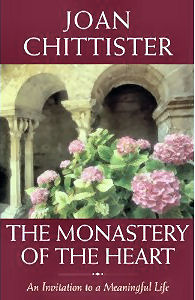
|
Posted April 14, 2011
Book: The Monastery of the Heart: An Invitation to a Meaningful Life Author: Joan Chittister BlueBridge, www.bluebridgebooks.com. 2011. Pp.224 An Excerpt from the Jacket:
Every time, every culture has sought the spiritual dimensions of life in particular ways, in language and symbols and lifestyles it could embrace. Across the ages, countless men and women in East and West chose the path of monastic life, either in solitude or in community. One of them was Benedict of Nursia, the sixth-century founder of communal monasticism in the Western world. For Benedict, the spiritual life lay in simply living this life, our daily life, well. He turned the ordinary into an experience of the extraordinary, a union with the sacred in the here and now. His enduring legacy — Benedictine spirituality based on the Rule of Benedict — exists to this day, around the world. The Monastery of the Heart is Joan Chittister’s powerful spiritual guide for all of us who are seeking a more purposeful life today, in a time of social upheavals and global transformations. It is written for seekers of any faith or none – individuals, couples, families, and small groups — who are looking for true meaning while facing seemingly countless options, both spiritual and secular, and are feeling overwhelmed by choices. It builds on the ancient Rule of Benedict to show us new ways of meaningful living in the very center of our own world — without ever withdrawing from it. The Monastery of the Heart is anchored in the Rule, rooted in its values, but attempts to redefine it for seekers today. Fresh in its form and focus, it invites us to become within ourselves monastics of the heart. An Excerpt from the Book: Silence “Monastics should diligently cultivate silence at all times.” Silence is the mother of the Spirit. It births in us the cloister of the heart. It brings us beyond the noise of chaos and clutter and confusion of a spinning world to the cool, calm center of the spiritual self. Silence enables us to rest in that center, to allow God to work in us there, to clear from our hearts whatever thoughts or pain, desires or demands, clamor within us for puerile attention and so take us away from our best selves. In silence, we learn to listen to others who are also seeking God in a Monastery of the Heart, to hear their pain and their wisdom, their experiences and the truths in them, that bring our own wisdom to light, to question, to development. It is silence that keeps us from giving full rein to the empty imaginings and cruel commentaries always too fresh at hand in our narcissistic selves. “It is written,” the Rule teaches, “In a flood of words you will not avoid sin.” We are expected, invited, then, to surrender the satisfaction of the too sharp retort, the too sour remark, the too common temptation to dishonesty that comes with the rattle of empty speech, of speech that is not reflective, of speech that wastes the depth of life on the mundane. In a Monastery of the Heart, we are challenged to exchange all those empty ideas for the depth of reflection, the calm of thought, and clarity of insight that silence brings in its wake to the soul that longs — in silence — for to come. Silence protects us from our noisy selves and prepares us for the work of God in us. In silence, we come to understand ourselves. In silence we become able to hear the voice of God calling us beyond ourselves — always to the better, always to the more. It is of the essence, then, that in a Monastery of the Heart space for silence be treasured and guarded, sought and made sacred, so that the spiritual life may grow and flourish in us — where otherwise only the weeds of empty words may take root. When we make space for silence in our lives, we take the time to heal what it is in us that still simmers and burns hidden away — sometimes even from ourselves — but fierce in its perdurance and its ability to scorch our souls with the acids of time long past. As the Rule reminds us, “It is written, ‘The tongue holds the key to life and death.’” It is silence that shields us from our first impulses to resist changes or reject new challenges or rebut new ideas or denounce the ideas of others. It is silence that refuses to let us use humor to wound or sarcasm to degrade or criticism to demean. “We absolutely condemn,” the Rule teaches, “any vulgarity and gossip and talk leading to laughter.” Instead, silence lays us open to possibilities, to people, to ideas we would have otherwise forever scorned. Table of Contents:Our Search1. A gentle invitation 2. A seeker’s path 3. A single vision Our Interior Life 4. Prayer 5. Silence 6. Prayerful reading 7. Retreat and reflection Our Community 8. Mutuality 9. Equality 10. Direction and counsel 11. Sufficiency and sharing 12. Nourishment Our Service 13. Good work 14. Co-creation 15. Loving care 16. Responsibility 17. Hospitality Our Promise 18. A listening heart 19. Conversion of heart 20. Stability of heart Our Spiritual Growth 21. Humility 22. Spiritual tools 23. Sacred art 24. Good zeal 25. Peace |
|
